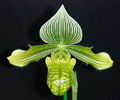|
|
|
|
|
| |
Flasks of
Paphiopedilum venustum var. album 'MoJo' × self |
|
| |
|
|
| |
|
|
Click to Enlarge

Pod Parent Flower |
|
|
|
| |
For additional origin/habitat information supplied courtesy of
Charles and Margaret Baker, see further below, near the bottom of this page.
|
Temperatures we attempt to use in the lab & greenhouse:
| For Species: |
|
Spring, Summer, Autumn: days average 77°F, nights 68°F; best fit is Intermediate 83-60°F
(Source:
Baker's Web OSC) |
| For Species: |
|
Winter: days average 59°F, nights 47°F; best fit is Cool-Cold 64-44°F
(Source:
Baker's Web OSC) |
|
About the name...
| Etymology of |
album |
|
From Latin "albus" white.
(Source:
Mayr & Schmucker 1998) |
| Etymology of |
Paphiopedilum |
|
From Greek "Paphia" the name of Aphrodite of Cypress; "pedilon", sandal.
(Source:
Pridgeon 1992) |
| Etymology of |
venustum |
|
From Latin "venustum" lovely, charming.
(Source:
Mayr & Schmucker 1998) |
| Pronunciation of |
album |
|
AL-bum
(Source:
Hawkes 1978) |
| Pronunciation of |
Paphiopedilum |
|
paf-ee-oh-PED-i-lum
(Source:
Pridgeon 1992) |
| Pronunciation of |
venustum |
|
ve-NOOS-tum
(Source:
Hawkes 1978) |
|
If you would like to direct someone to this web page, please copy and paste this URL into your email:
http://troymeyers.com/d?017802
| Flask Information |
| Availability: |
We have sold all of the flasks for this item. |
| You should: |
Consider getting individual plants or compots instead of a flask.
You can place a "Notify Flask Recipients" Request, and either we or a flask recipient may contact you when plants are available.
You may also place a "Notify Retries" Request, and if an identical pollination (the same parents) is done again, we'll let you know.
You may reserve a flask, but it's very unlikely you'll get one ...this could only happen if we found a flask that we didn't know we had. |
| Yield Estimate: |
240 plants (based on flask surveys done 05/26/2014 through 07/16/2014)
|
| Plantlet Sizes: |
From many flasks 20 - 60 mm plants (based on flask surveys done 05/25/2015 through 07/29/2015)
From one most recently surveyed flask 20 - 40 mm (07/29/2015)
|
|
You might also want to:
|
View the seed assay for this item.
View items of the same species.
View items of the same genus.
|
| Ordering Information |
| You are not currently logged in. |
|
You must be a registered user and be logged in to reserve a flask or place a notification request. Please log in:
|
|
|
|
|
|
| |
The origin/habitat information below is supplied courtesy of Charles and Margaret Baker
The following information is based on the name of the plant provided by the donor, and assumes that the name is correct. If the plant has been misidentified, then the following information may not be correct.
This text is copyrighted by the Bakers and may not be reproduced without permission.
ORIGIN/HABITAT: Southern slopes of the Himalayas in Eastern Nepal,
Darjiling (Darjeeling), Sikkim, and Bhutan. They are also found in
northeastern India in the Meghalaya district and in Assam north of the
Bramaputra River. P. venustum usually grows at 1000-4450 ft. (300-1350 m).
Plants normally grow in humus in dense jungle undergrowth at the base of
cliffs, or in dense bamboo thickets. However, they are occasionally found
in tree crotches with their roots in composted leaf litter.
More about this information and the Bakers...
|
|
|
| |
|
|
|